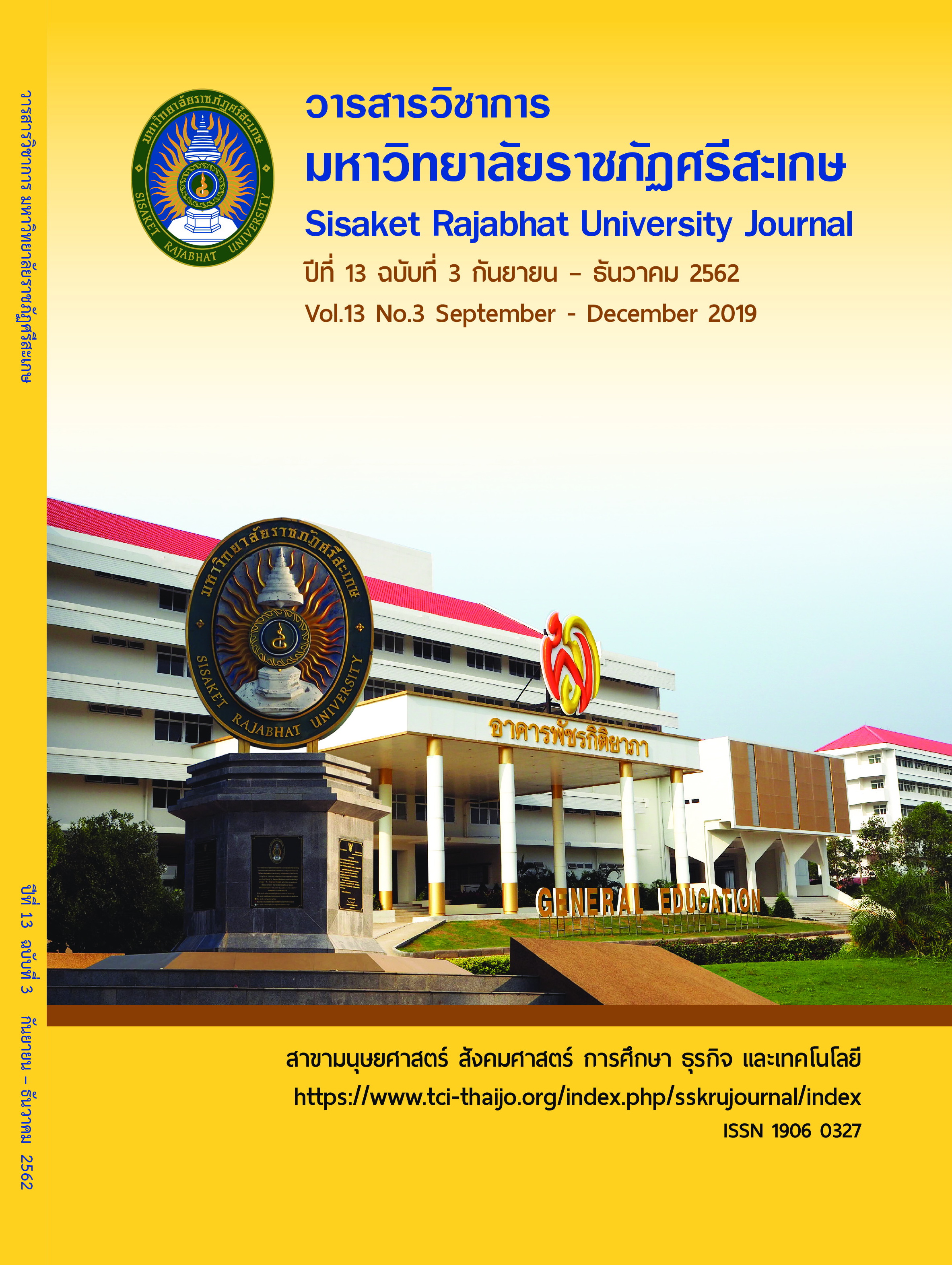แนวทางพัฒนาการท่องเที่ยวเชิงสร้างสรรค์บนพื้นฐานอัตลักษณ์และวิถีไทย แบบบูรณาการอย่างยั่งยืน ในเขตบางกอกน้อย กรุงเทพมหานคร
Main Article Content
บทคัดย่อ
การวิจัยครั้งนี้มีวัตถุประสงค์เพื่อ 1) ศึกษาศักยภาพของการพัฒนาการท่องเที่ยวเชิงสร้างสรรค์บนพื้นฐานอัตลักษณ์และวิถีไทย แบบบูรณาการอย่างยั่งยืนในเขตบางกอกน้อย กรุงเทพมหานคร 2)เสนอแนวทางการพัฒนาการท่องเที่ยวเชิงสร้างสรรค์บนพื้นฐานอัตลักษณ์และวิถีไทย แบบบูรณาการอย่างยั่งยืนในเขตบางกอกน้อย กรุงเทพมหานคร โดยใช้วิธีการวิจัยเชิงคุณภาพ รูปแบบการวิจัยเชิงปฏิบัติการแบบมีส่วนร่วม ซึ่งมีผู้ให้ข้อมูลหลักจำนวน 32 คน จากภาครัฐ ภาคเอกชน ประชาชนและนักท่องเที่ยวที่เดินทางมายังเขตบางกอกน้อย
ผลการศึกษาพบว่า 1) ชุมชนบางกอกน้อย กรุงเทพมหานครมีศักยภาพด้านทรัพยากร ด้านการจัดการทรัพยากรอย่างยั่งยืน ด้านการมีส่วนร่วมของชุมชน และด้านการมีส่วนร่วมของการปลุกจิตสำนึกในการพัฒนาการท่องเที่ยวเชิงสร้างสรรค์บนพื้นฐานอัตลักษณ์และวิถีไทย แบบบูรณาการอย่างยั่งยืน 2) แนวทางการพัฒนาการท่องเที่ยวเชิงสร้างสรรค์บนพื้นฐานอัตลักษณ์และวิถีไทย แบบบูรณาการอย่างยั่งยืนได้แก่ การสร้างแบรนด์การท่องเที่ยวเชิงสร้างสรรค์ชื่อ สุขสันต์วันท่องเที่ยวบางกอกน้อยเชิงสร้างสรรค์ ซึ่งเป็นแบรนด์รวมของแบรนด์เชิงสร้างสรรค์ย่อย 5 แบรนด์ พร้อมทั้งกลยุทธ์และโครงการเชิงสร้างสรรค์ของแต่ละ แบรนด์ได้แก่ 1) แบรนด์ท่องเที่ยวธรณีสัณฐาน ระบบนิเวศน้ำจืดลุ่มแม่น้ำเจ้าพระยาเชิงสร้างสรรค์ เพื่ออนุรักษ์สิ่งแวดล้อม 2) แบรนด์ท่องเที่ยวประวัติศาสตร์ยุคกรุงธนบุรีเชิงสร้างสรรค์ เพื่ออนุรักษ์ประวัติศาสตร์ท้องถิ่น 3) แบรนด์ท่องเที่ยวกรุงธนบุรีศรีมหาสมุทรดินแดนแห่งศิลปะไทย 3 ยุค เพื่ออนุรักษ์ศิลปวัฒนธรรมและพัฒนาจิตใจ 4) แบรนด์สัมผัสวิถีชีวิตชุมชนริมแม่น้ำลำคลอง ทัวร์คลอง ทัวร์สวน นอนโฮมสเตย์เชิงสร้างสรรค์เพื่ออนุรักษ์วิถีชีวิตไทย 5) แบรนด์สัมผัสสังคมพหุวัฒนธรรม พุทธ คริสต์ อิสลาม สัมผัสวัฒนธรรมอาหารที่หลากหลายในตลาดเขตบางกอกน้อยเพื่อพัฒนาเศรษฐกิจท้องถิ่นและกระจายรายได้สู่ชุมชน ทั้งนี้การพัฒนาแบรนด์ทั้ง 5 แบรนด์ของการท่องเที่ยวเชิงสร้างสรรค์ของเขตบางกอกน้อย จะพัฒนาในรูปแบบของโครงการของแต่ละแบรนด์ ซึ่งให้ความสำคัญกับการใช้รูปแบบของการพัฒนาธุรกิจเชิงสร้างสรรค์ ที่เน้นการเปิดโอกาสให้นักท่องเที่ยวได้มีส่วนร่วมในกิจกรรมเชิงสร้างสรรค์ และได้เพิ่มพูนประสบการณ์ที่แตกต่างแก่ชีวิตของนักท่องเที่ยว
Article Details
1. เนื้อหาและข้อมูลในบทความที่ลงตีพิมพ์ในวารสารวิชาการมหาวิทยาลัยราชภัฏศรีสะเกษ ถือเป็นข้อคิดเห็นและความรับผิดชอบของผู้เขียนบทความโดยตรง ซึ่งกองบรรณาธิการวารสาร ไม่จำเป็นต้องเห็นด้วย หรือร่วมรับผิดชอบใด ๆ
2. บทความ ข้อมูล เนื้อหา รูปภาพ ฯลฯ ที่ได้รับการตีพิมพ์ในวารสารวิชาการมหาวิทยาลัยราชภัฏศรีสะเกษ กองบรรณาธิการไม่สงวนสิทธิ์ในการคัดลอกบทความเพื่อการศึกษา แต่ให้อ้างอิงแหล่งที่มาให้ครบถ้วนสมบูรณ์
เอกสารอ้างอิง
กระทรวงการท่องเที่ยวและกีฬา. (2558). แผนพัฒนาเศรษฐกิจและสังคมแห่งชาติ
ฉบับที่ 11 พ.ศ. 2555-2559. สืบค้นเมื่อวันที่ 11 มีนาคม 2559, จาก http://www.tourism-asean.org.
กระทรวงการท่องเที่ยวและกีฬา. (2558). ยุทธศาสตร์การท่องเที่ยวไทย พ.ศ. 2558–2560. สืบค้นเมื่อ 25 มีนาคม 2559, จาก http://www.mots.go.th.
เคลาส์ ชวาบ. (2559). การปฏิวัติอุตสาหกรรมครั้งที่4. แปลโดย ศรรวริศา เมฆไพบูลย์. กรุงเทพฯ: Amarin HOW-TO.
ดอน แท็บสก็อต.(2559). เศรษฐกิจดิจิทัล. แปลโดย พรศักดิ์ อุรัจฉัทชัยรัตน์. กรุงเทพฯ:แมคกรอ-ฮิล.
ปิยะชาติ อิศรภักดี. (2559). BRANDING 4.0 (พิมพ์ครั้งที่ 1). กรุงเทพฯ: Amarin HOW-To.
พยอม ธรรมบุตร. (2558). เอกสารประกอบการเรียนการสอนวิชา การจัดการท่องเที่ยวเชิงอนุรักษ์.กรุงเทพฯ: สถาบันพัฒนาการท่องเที่ยว มหาวิทยาลัยศรีนครินทรวิโรฒ.
พยอม ธรรมบุตร. (2559). เอกสารประกอบการเรียนการสอนวิชา การจัดการสิ่งแวดล้อมเพื่อการท่องเที่ยว.กรุงเทพฯ: วิทยาลัยการจัดการ มหาวิทยาลัยพะเยา.
พยอม ธรรมบุตร. (2560). เอกสารประกอบการเรียนการสอนเกี่ยวกับองค์ประกอบของการท่องเที่ยว. กรุงเทพฯ: วิทยาลัย การจัดการ มหาวิทยาลัยพะเยา.
วิจารณ์ พานิช. (2553). มหาวิทยาลัยไทยต้องเปลี่ยนลุคส์ใหม่เพื่อสังคม สร้างจิตสำนึกใหม่การศึกษา. สืบค้นเมื่อ 16 มกราคม 2560, จาก https://www.isranews.org/thaireform/thaireform-talk-interview/thaireform-talk-social/13483-2010-05-07-12-05-37.html.
สมบัติ กุสุมาวลี.(2558). เศรษฐกิจเชิงสร้างสรรค์,กรุงเทพฯ : จุฬาลงกรณ์มหาวิทยาลัย
สุภางค์ จันทวานิช. (2558). วิธีการวิจัยเชิงคุณภาพ. กรุงเทพฯ : สำนักพิมพ์แห่งจุฬาลงกรณ์มหาวิทยาลัย.
ธีระภัทรา เอกผาชัยสวัสดิ์.(2553).ชุมชนศึกษา.กรุงเทพฯ : สำนักพิมพ์แห่งจุฬาลงกรณ์มหาวิทยาลัย.
Alastair Morrison.(2013). Marketing and Management Tourism Destination. Routledge. 711 Third
Avenue,New York,NY10017
Ohridska – Olson, R. (2010). The Creative Tourism Business Model, Cultural
Realms, URL: http://www.culturalms.com
Pine,B.J.LL.HJ, Gilmore (1999),The experience Economy: work is theatre and every business a stage.
Boston, Ma. Haward Business School Press.


